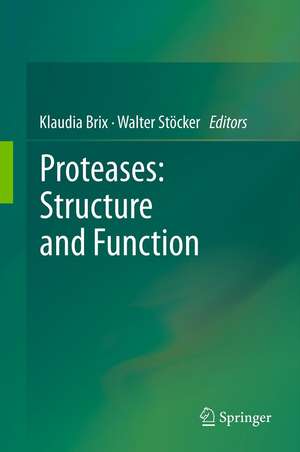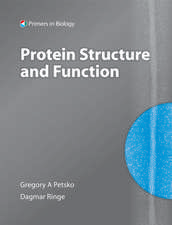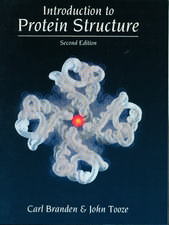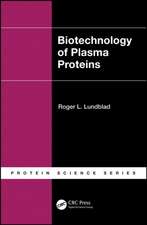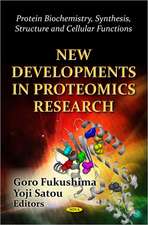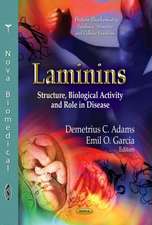Proteases: Structure and Function
Editat de Klaudia Brix, Walter Stöckeren Limba Engleză Hardback – 4 feb 2014
| Toate formatele și edițiile | Preț | Express |
|---|---|---|
| Paperback (1) | 1230.03 lei 6-8 săpt. | |
| SPRINGER VIENNA – 23 aug 2016 | 1230.03 lei 6-8 săpt. | |
| Hardback (1) | 1066.78 lei 39-44 zile | |
| SPRINGER VIENNA – 4 feb 2014 | 1066.78 lei 39-44 zile |
Preț: 1066.78 lei
Preț vechi: 1403.65 lei
-24% Nou
Puncte Express: 1600
Preț estimativ în valută:
204.14€ • 218.28$ • 170.20£
204.14€ • 218.28$ • 170.20£
Carte tipărită la comandă
Livrare economică 14-19 aprilie
Preluare comenzi: 021 569.72.76
Specificații
ISBN-13: 9783709108840
ISBN-10: 3709108845
Pagini: 600
Ilustrații: XII, 564 p. 98 illus., 65 illus. in color.
Dimensiuni: 155 x 235 x 38 mm
Greutate: 0.93 kg
Ediția:2013
Editura: SPRINGER VIENNA
Colecția Springer
Locul publicării:Vienna, Austria
ISBN-10: 3709108845
Pagini: 600
Ilustrații: XII, 564 p. 98 illus., 65 illus. in color.
Dimensiuni: 155 x 235 x 38 mm
Greutate: 0.93 kg
Ediția:2013
Editura: SPRINGER VIENNA
Colecția Springer
Locul publicării:Vienna, Austria
Public țintă
ResearchCuprins
1 Protease families, evolution and mechanisms of action "Set the stage".- 1.1 Enzyme families, prototypes and catalytic mechanisms.- 1.2 Enzyme kinetics, mathematical modelling and perspectives.- 1.3 Structure determination and search for inhibitors.- 2 Regulation of proteolysis "Positioning and teaming-up to control activity".- 2.1 Compartmentalization of proteolysis.- 2.2 Biosynthesis of lysosomal proteases.- 2.3 Interactions of proteases and inhibitors / networking in the degradome.- 2.4 In vivo analysis of the protease and inhibitors concert.- 3 Proteases in development "Born to be right".- 3.1 Proteases for pattern formation during morphogenesis.- 3.2 Proteases in death pathways (apoptosis, necrosis).- 4 Proteases in physiology and pathophysiology „Cleave to function in health or to cause disease".- 4.1 Protein turnover and signaling functions (degrade to rebuild, remodel, process and mature for signalling).- 4.2 Proteases in control of physiology.- 4.3 Cancer: invasion and metastasis.- 4.4 Bacterial proteases.- 4.5 Viral proteases.
Textul de pe ultima copertă
Proteolysis is an irreversible posttranslational modification affecting each and every protein from its biosynthesis to its degradation. Limited proteolysis regulates targeting and activity throughout the lifetime of proteins. Balancing proteolysis is therefore crucial for physiological homeostasis. Control mechanisms include proteolytic maturation of zymogens resulting in active proteases and the shut down of proteolysis by counteracting endogenous protease inhibitors. Beyond the protein level, proteolytic enzymes are involved in key decisions during development that determine life and death – from single cells to adult individuals. In particular, we are becoming aware of the subtle role that proteases play in signaling events within proteolysis networks, in which the enzymes act synergistically and form alliances in a web-like fashion. Proteases come in different flavors. At least five families of mechanistically distinct enzymes and even more inhibitor families are known to date, many family members are still to be studied in detail. We have learned a lot about the diversity of the about 600 proteases in the human genome and begin to understand their physiological roles in the degradome. However, there are still many open questions regarding their actions in pathophysiology. It is in this area where the development of small molecule inhibitors as therapeutic agents is extremely promising. Approaching proteolysis as the most important, irreversible post-translational protein modification essentially requires an integrated effort of complementary research disciplines. In fact, proteolytic enzymes seem as diverse as the scientists working with these intriguing proteins. This book reflects the efforts of many in this exciting field of research where team and network formations are essential to move ahead.
Caracteristici
Written by designated experts in the field defined models are described Ensures a better understanding of biological significance of proteinases Clearly shows the diversity and networking of enzymes Includes supplementary material: sn.pub/extras
